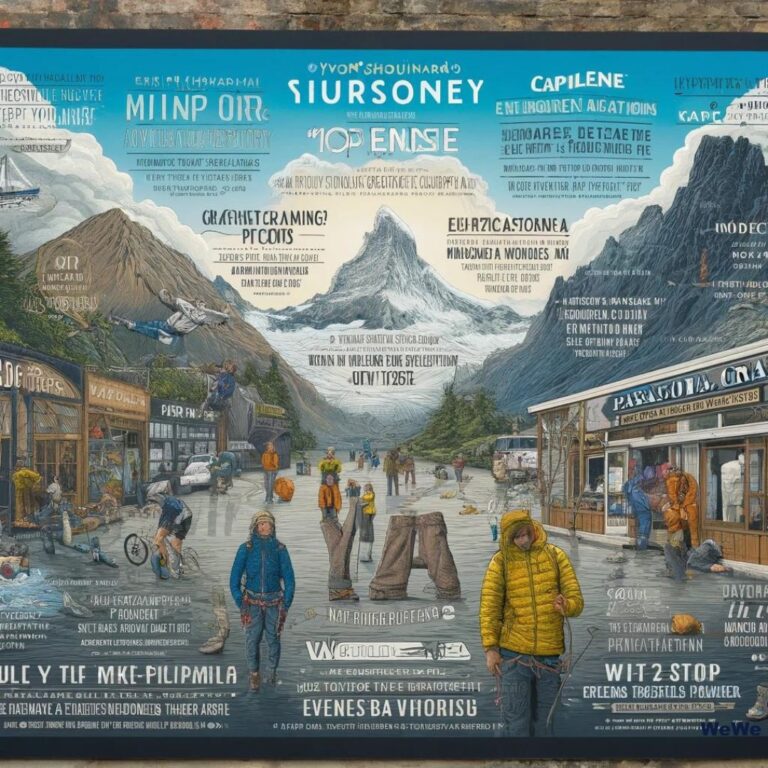Patagonia, a name synonymous with outdoor adventure, environmental stewardship, and innovative design, has become an iconic brand in the world of outdoor apparel. Founded by Yvon Chouinard in 1973, Patagonia’s journey from a small climbing equipment company to a global leader in sustainable business practices is a story of vision, passion, and unwavering commitment to the planet.
Early Beginnings
The seeds of Patagonia were sown long before its official founding in 1973. Yvon Chouinard, an avid rock climber and environmentalist, began his entrepreneurial journey in the late 1950s. Frustrated with the quality of climbing equipment available at the time, Chouinard started making his own gear. He taught himself blacksmithing and began crafting pitons, a type of metal spike used in climbing. His innovative designs quickly gained a reputation for their durability and performance.
In 1965, Chouinard partnered with Tom Frost to form Chouinard Equipment, Ltd., which soon became the leading supplier of climbing hardware in the United States. However, Chouinard’s passion for the environment and climbing led him to rethink the impact of his products. Realizing that his steel pitons were causing damage to rock faces, he began developing alternative equipment that would be less harmful to the environment.
The Birth of Patagonia
In 1972, Chouinard Equipment introduced a new line of environmentally friendly climbing tools, marking a significant shift in the company’s philosophy. The following year, Chouinard expanded his business into clothing, launching Patagonia with the mission to create high-quality, durable, and sustainable outdoor apparel.
The name “Patagonia” was inspired by the remote and rugged region of South America, reflecting the brand’s spirit of adventure and exploration. From the outset, Patagonia distinguished itself with its innovative designs and commitment to environmental responsibility. The company’s first major success came with the introduction of the rugby shirt, which became a favorite among climbers for its durability and style.
Innovation and Environmental Activism
Throughout the 1980s and 1990s, Patagonia continued to push the boundaries of outdoor apparel design. The company introduced groundbreaking products such as the Synchilla fleece, Capilene base layers, and the iconic Baggies shorts. Each product was designed with a focus on functionality, durability, and sustainability.
Patagonia’s commitment to the environment went beyond its products. In 1985, the company established the “1% for the Planet” initiative, pledging to donate 1% of its sales to environmental causes. This program has since grown into a global movement, with over 1,200 companies participating.
The company’s dedication to sustainability was further demonstrated in the 1990s when Patagonia became one of the first companies to switch to organic cotton. This decision was driven by concerns over the environmental impact of conventional cotton farming, and it set a new standard for the industry.
Challenges and Growth
Despite its success, Patagonia faced numerous challenges along the way. The company experienced significant financial difficulties in the early 1990s, prompting a period of introspection and restructuring. Chouinard and his team took this opportunity to reaffirm their commitment to environmental responsibility and sustainable business practices.
One of the most notable outcomes of this period was the development of the “Common Threads Initiative,” launched in 2005. This program aimed to reduce consumption and waste by encouraging customers to repair, reuse, and recycle their Patagonia products. The company’s Worn Wear program, which promotes the repair and resale of used Patagonia gear, has become a cornerstone of this initiative.
Patagonia Today
Today, Patagonia stands as a beacon of environmental activism and corporate responsibility. The company continues to lead the way in sustainable business practices, from using recycled materials in its products to advocating for climate action and social justice. In 2018, Patagonia made headlines by announcing that it would donate the $10 million it saved from tax cuts to environmental groups, further cementing its reputation as a values-driven brand.
Yvon Chouinard’s vision and dedication
to preserving the natural world remain at the heart of Patagonia’s mission. The company’s leadership, now under CEO Ryan Gellert, continues to champion environmental causes and inspire change within the industry.
Impact and Legacy
Patagonia’s influence extends beyond the world of outdoor apparel. The company’s innovative approach to business has inspired a new generation of entrepreneurs and companies to prioritize sustainability and social responsibility. Patagonia has demonstrated that it is possible to achieve commercial success while staying true to core values and making a positive impact on the planet.
The brand’s commitment to environmental activism has also had a profound effect on public awareness and policy. Patagonia has been involved in numerous campaigns to protect public lands, combat climate change, and promote fair labor practices. The company’s advocacy work, often bold and unapologetic, has earned it both praise and criticism but has undoubtedly contributed to significant environmental victories.
The history of Patagonia is a testament to the power of visionary leadership and a steadfast commitment to ethical principles. From its humble beginnings as a small climbing equipment company to its current status as a global leader in sustainability, Patagonia has carved a unique path in the business world. Yvon Chouinard’s dream of creating products that are both functional and environmentally responsible has become a reality, inspiring countless others to follow in his footsteps.
As Patagonia looks to the future, it remains dedicated to its mission of saving our home planet. The company’s journey serves as a powerful reminder that businesses can be a force for good, driving positive change and fostering a more sustainable and just world for generations to come.

